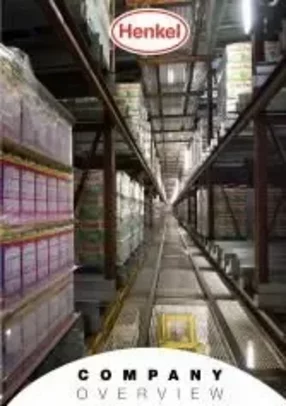An emphasis on quality and strategic development
Since day one, the company has put a great deal of emphasis on quality, and this has truly driven and underpinned its success to date.
“We strive for the very best in everything that we do,” says Johann Seif, International Planning & Logistics. “This applies not only to the products and technologies that we develop for our customers but also to our internal processes.”
The goal to take leading positions in a highly competitive environment is shared by everyone at Henkel, irrespective of the business unit, function or country in which they work. In order to achieve the company’s ambitious plans it has focused on four strategic priorities: “We will outperform our competition as a globalized company with simplified operations and a highly inspired team.”
As a global player, Henkel has put a lot of time into building a strong foundation for future growth and development. “The basis for our strategy was a detailed analysis of major long-term market trends. We identified three megatrends which will affect our different businesses over the next years: consolidation, emerging markets and speed.
“Consolidation in our supplier, manufacturer and customer base as well as in our competitive environment will continue. Size will become a critical success factor in the future. Consequently, we need to grow our businesses. We expect the shift of growth from mature to emerging markets to continue. As a result, we need to expand our already strong footprint in these markets over the coming years.
“We anticipate highly dynamic market evolution, and faster decision-making by suppliers, customers and competitors. In addition, further digitalization will lead to changes in our market environment. We therefore need to continue simplifying our processes and increasing our operational excellence,” explains Seif.
Supply chain management
How does a company with such a broad clientele remain relevant and achieve ambitious business development aims? “In order to grow, we have to remain mobile as a business,” says Seif. “A huge part of our ongoing strategy is to analyse what to grow in terms of facilities and expertise, and a large part of our strategy in this area is focused on taking our services to the customer. This is a constant work in progress, but being agile in key to our success. We have a flexible network and despite our size we need to be mobile so we can react to industry changes. At the company we believe that country borders shouldn’t hold us back, and aim to deliver a relevant and consistent service to all our customers, no matter where they are located.”
With global and regional distribution centres inventory and planning is critical to business development. “We need to focus on demand,” says Seif. “However, we also need to be clever about how we run our supply chain operations, for example economies of scale, efficiency and agile processes and systems need to be well thought out and delivered.”
In order to create a more robust supply chain, Henkel has optimized its warehouse operations by using automation not only on the warehouse floor but also from an administrative point of view. It has also simplified workflows and tools and centralised its IT services allowing for greater visibility, less down time and thus greater efficiency.
“We have invested in the supply chain technology to give us complete visibility. We look into what we should stock and what we should not to ensure we don’t have too many slow moving products. We believe it’s possible to forecast demand and react to that as much as possible,” he says.
Relying on a team of experts
All the technology in the world doesn’t make up for a poor team, so the company has spent a lot of time and effort recruiting a world-leading workforce. “We focus on internal promotions, training and personal development to ensure our people are the best in their field,” says Seif.
“Our ultimate objective is to want to grow from both a product and customer perspective and this would be impossible without people. We back this up where we can with data analysis and technology,” he says.
Dedicated to sustainability
Henkel’s commitment to leadership in sustainability is deeply embedded in its corporate values. Maintaining a balance between economic success, protection of the environment, and social responsibility has been fundamental to the company’s corporate culture for decades. This approach applies to every business unit and function, and our almost 50,000 employees all over the world have firmly embraced the principles of sustainable development in their daily work and think and act accordingly.
“To maintain this lead in the future, we have developed a long-term sustainability strategy and set a straightforward yet ambitious goal for the year 2030: By this year, all Henkel products and processes should be three times as efficient as they are today,” says Seif.
“This aim addresses one of the central challenges we will face in the future: decoupling growth from resource consumption. Instead, we want to create more value – for our customers and consumers, for the communities we operate in, and for our company – while reducing our environmental footprint at the same time. Achieving more with less – this is the idea at the heart of our sustainability strategy which guides all of our business processes and activities.”
With robust processes, world leading clients, and a focus on sustainability, Henkel is set to deliver its ambitious targets and retain its global reputation for many more years to come.


